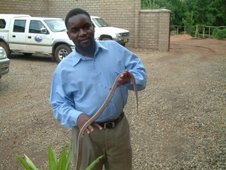Bingu needs not step down
By Hastings Maloya
Democracy in Malawi is steadily coming of age as is manifested by the freedoms that include the freedom to speak ones mind without reprisals. Gone are the days when young democrats were almost rulers as they could create an environment of intimidation and torture. Yes Malawians were not able to speak their minds lest one was asking for a rain of blows in case what you said was not in line with the thinking of the ruling clique.
Today people of different political thoughts and beliefs are able to sit together, enjoy, laugh and agree to disagree on various matters. People are free to be quote in the media regardless of the issue they would like to bring forth. Things do change over time indeed.
This freedom of expression is very good though to a certain degree it leads us to say things thus irrelevant to our society and negative to the development of our country.
This brings me to the subject of debate today. Some politicians and analysts say President Bingu wa Mutharika needs to step down or resign as minister of agriculture because according to their thinking, Dr Mutharika has failed to run the ministry. They single out the main reason for the ‘failure’ as being busy with the office of head of state.
The said politicians and analysts say the fertilizer subsidy programme has not gone well. In case that is true, instead of coming out with possible reasons that may have led to the problem, they only suggest the removal of Dr Mutharika as minister responsible. Seems they could have expected the minister to be at every fertilizer selling point in Malawi or he was supposed to be seen distributing coupons himself to qualify as performing his duties.
I find this very unfortunate and unhelpful.
These opposition politicians let alone the analysts, to me seem to be attention seekers, just excited to have their names and pictures seen in newspapers or their voices heard on radios. They are not for national building. They were around when parliament took ages to approve the budget for this financial year. They know it took several months of discussing the budget, indications of it being refused and all the drama that was associated with it. So here are our commentators who cannot count how many months it took after the approval of the budget to have a good system in place for the production and distribution of coupons, the purchase of fertilizer and to transport it to all corners of Malawi.
Its sad that some people cannot appreciate the fact that fertilizer is not manufactured in Malawi, let alone we do not have our own ports for easy transportation. Here are people who cannot think of the logistics associated with this exercise and the costs. The ministry of agriculture managed it, problems or no problems, fertilizer saw its way to almost all parts of Malawi. And honestly we call for the resignation of the minister?
The argument that the ministry of agriculture is one of the most involving ministries and that it is difficult for the president to head it does not hold water. We have had a situation where the late Dr Hastings Kamuzu Banda held this ministry up until the time that he was very old but it was a success. It is also not true that it requires moving around frequently for the success of this ministry.
Government, on behalf of the nation employs people whom we call civil servants and they are expected to work on behalf of the president, the government and the entire nation to deliver as is required. In short, government, through the ministry of agriculture, just as is the case with all other ministries, has its ears, eyes, nose and hands on the ground throughout the country. It is therefore unfair to put blame on the minister on activities that could or are supposed to be carried out by the people employed to do that.
The ministry of agriculture is well structured. It has Dr Mutharika as the minister and Bitony Kunsaira as deputy. It has eight agriculture development divisions (ADDs) across the three regions of the country and it employs young and educated men and women responsible for field activities. It is therefore ridiculous to expect the whole minister frequently visiting all the ADDs as is suggested by some opposition leaders and our self-styled analysts. Any minister, not because he or she is the president, cannot be on the run from one office to another because the minister mostly deals with issues of policy.
In all fairness, the problem here could not necessarily be on the administration by the minister but the little support that government got from the opposition ion parliament. Our opposition worked tirelessly, with little success to see the agriculture sector fail.
It was the same ministry that managed to construct silos in Mangochi, which we are told are full with the staple food. Was it not the same ministry that facilitated better prices for tobacco growers at the auction floors? How about the improved market prices for cotton? I think we need to give credit where it is due.
Just a month ago, for the first time in the history of Malawi, we have seen one of the most influential, respected and national newspaper in the United States – the New York Times writing very positively about the achievement of Malawi on food security. The paper commended Malawi’s ministry of agriculture for its sound policies that have led to Malawi having enough food. I wonder which policies such an advanced country saw in our ministry that cannot be seen by a fellow Malawian. Maybe we talk of envy as our main problem.
It could make some sense if our analysts maybe said that some people employed to manage different arms of the ministry, who, just as is the case with any manager were supposed to technically and professionally know how to handle situations as they come, are not doing a good job. In case we have managers that are just sitting phwiii, we need not blame the minister lest he proposes the firing of the front line staff.
How I wish the said politicians and analysts called for the resignation of the national football coach! Definitely they could have had better reasons.
It is high time Malawians woke up and started being patriotic to their nation. In case there is any problem that affected the subsidy programme, why not take it as our problem and we play a role in sorting it than being faultfinders. Let us ask ourselves what role we have played to assist in the fair distribution of coupons and how many of the poor households that have we assisted in cash or kind to enable them buy the fertilizer?
It is very unfortunate that our political analysts are only bent to look at the negative side of issues without complementing the positives. Why should it take the New York Times in the US to note the successes of Malawi on food security when our learned analysts cannot see? Do they deserve being called analysts?
In summary, it is coming out very clearly that calls for the resignation of Dr Bingu wa Mutharika as minister of agriculture are only out of malice and lack of appreciation. None among the so-called analysts have come out with a possible name of a candidate they think would do better than Dr Mutharika. But this could be one of the fruits of democracy and freedom of expression. Democracy in Malawi is indeed taking shape.
All in all, Dr Mutharika has performed. He needs not step down, as there is no reason.
I WELCOME you!
Dear Good People,
I warmly welcome you to my Blog and it is my profound hope that you will find it useful and worth the time you spend on it. On this Blog, I have posted some of the articles and pieces that I have writen just for record purposes and also for sharing. You might have read these articles in the papers but it could also be possible that you missed them.
Please be advised that these are my toughts and purely my opinions. You are free to comment on them and/or to critic them. I will appreciate any of your comments.
Thank You.
Hastings Maloya
+265 888864241 or +265 999950953
I warmly welcome you to my Blog and it is my profound hope that you will find it useful and worth the time you spend on it. On this Blog, I have posted some of the articles and pieces that I have writen just for record purposes and also for sharing. You might have read these articles in the papers but it could also be possible that you missed them.
Please be advised that these are my toughts and purely my opinions. You are free to comment on them and/or to critic them. I will appreciate any of your comments.
Thank You.
Hastings Maloya
+265 888864241 or +265 999950953
About Me
- Hastings A. MALOYA
- Mulanje, Southern Region, Malawi
- Is an experienced journalist, writer, specialist in development communications, public relations, publications, desktop publishing, information technology, photography, environmental education and rural development. Hastings Maloya is currently working as Programme Officer responsible for Environmental Education, Awareness and Communications for the Mulanje Mountain Conservation Trust (MMCT) since September 1, 2002. Hastings, comes from Tradional Authority Mabuka in Mulanje District, is an Adventist Christian, and has two daughters Eva and Eve.
Misa delegates into Malawi’s oldest forest reserve

Misa delegates into Malawi’s oldest forest reserve
by Hastings Maloya
They arrived from all member countries of the Media Institute of Southern Africa (MISA). Malawians, as usual, showed their warmth in welcoming and making the visitors feel at home. Sunbird Mount Soche hotel was not a disappointment. For the first time Malawi hosted the regional indaba for scribes and after three days of serious deliberations, an out-of-hotel tour was necessary. The perfect and able conference organising team planned a visit to Mount Mulanje, Malawi’s island in the sky.
Those that had visited different mountains in their home countries thought they had seen the best. As such they might have not been very excited with the programme that indicated a tour to Mulanje Mountain. But when a briefing was made prior to the tour, only doubting delegates could have wanted to prove a point. Can Malawi indeed have such a wonderful resource? A surprise was in the wait!
The tour started soon after lunch. Had it been that the sites were boring, it could have been a perfect recipe for a slumber. But who could close one’s eyes past the Chipembere Highway with exchange of jokes from different countries? There we were, outside Limbe into the Thyolo road, past Bvumbwe and Thunga ~ yes the beauty of the tea fields kept the delegates silent for a while.
“Mr. Driver, please stop, I want to have a feel in my hands of a tea leaf! Oh! this is wonderful,” cried a South African before the plea was chorused by all while those with cameras were doing the actual jobs that the gadgets were made for. A slight wait took the delegates to the historical Mwala wa Nthunzi in Thyolo – a stone on the roadside. The history and stories associated with this stone were not only amazing but lured the visitors to make a special trip to Malawi. However, they were yet to see other things.
The journey had to go on. Past the Thyolo highlands the sight of Mount Mulanje was noted. Those that thought that they had visited mountains before realised that they have only been to hills. Yes the situate of the attractive Mount Mulanje took the delegates all the way past Chitakale trading centre into the Likhubula Valley past the Mulanje District Forest office to the Likhubula CCAP.
Every member wished this trip started in the morning. They wished they could have climbed up Chambe plateau, or at least a visit to the historical Dziwe la Nkhalamba, but time was not available.
Patricia Kawawa of the Likhubula CCAP House was an excellent guide around the place and to the Likhubula pools. She led the delegates into the Likhubula river, where a feel of the fresh waters was a toast of the day for the delegates, with everyone wishing to take a bath – yes if the costumes were available swimming tactics could have been experienced.
“This is just little about Mount Mulanje, there is more inside,” says Patricia to the pain of her visitors as now wished the time of their stay in Malawi was extended.
Time was spent in playing in the cold waters of Likhubula. How about exciting picnic pictures on the rocks of the rivers? Notebooks were looked for, pens in the hand and notes taken… yes the trademark of scribes – out to tell stories. To most of them this was a day they will live to remember.
But all good things have to come to an end. Time to get back to the hotel, but we need a drink…don’t we? Kara O’Mula, one most lovely lodge on the other side of the mountain was host for a mean cocktail. Just crowned up the already lovely day! With all the fascinating sceneries, the mountain left a mark in the minds of many.
Situated about 80 km from the commercial city of Blantyre, the attractive Mulanje with its Sapitwa Peak, standing over 3000m above sea level, is not only the highest mountain but also the most impressive and unique massif in the southern and central African region. It is is much more than a barren rock with its forest reserve thus made up of a range of ecological habitats from rain forest to alpine, woodland to grassland. There is a great diversity of plant and animal life and many of species are endemic. The most famous endemic is the magnificent and endangered Mulanje cedar, Malawi’s National Tree, which dominates the high altitude forests. With its evergreen forests, woodlands and montane grasslands, the mountain has attracted increasing attention to many tourists.
The journalists attested to it. And more to it, back to the hotel, Honourable Aleke Kadonaphani Banda had something in store for them
………ends
Subscribe to:
Comments (Atom)







